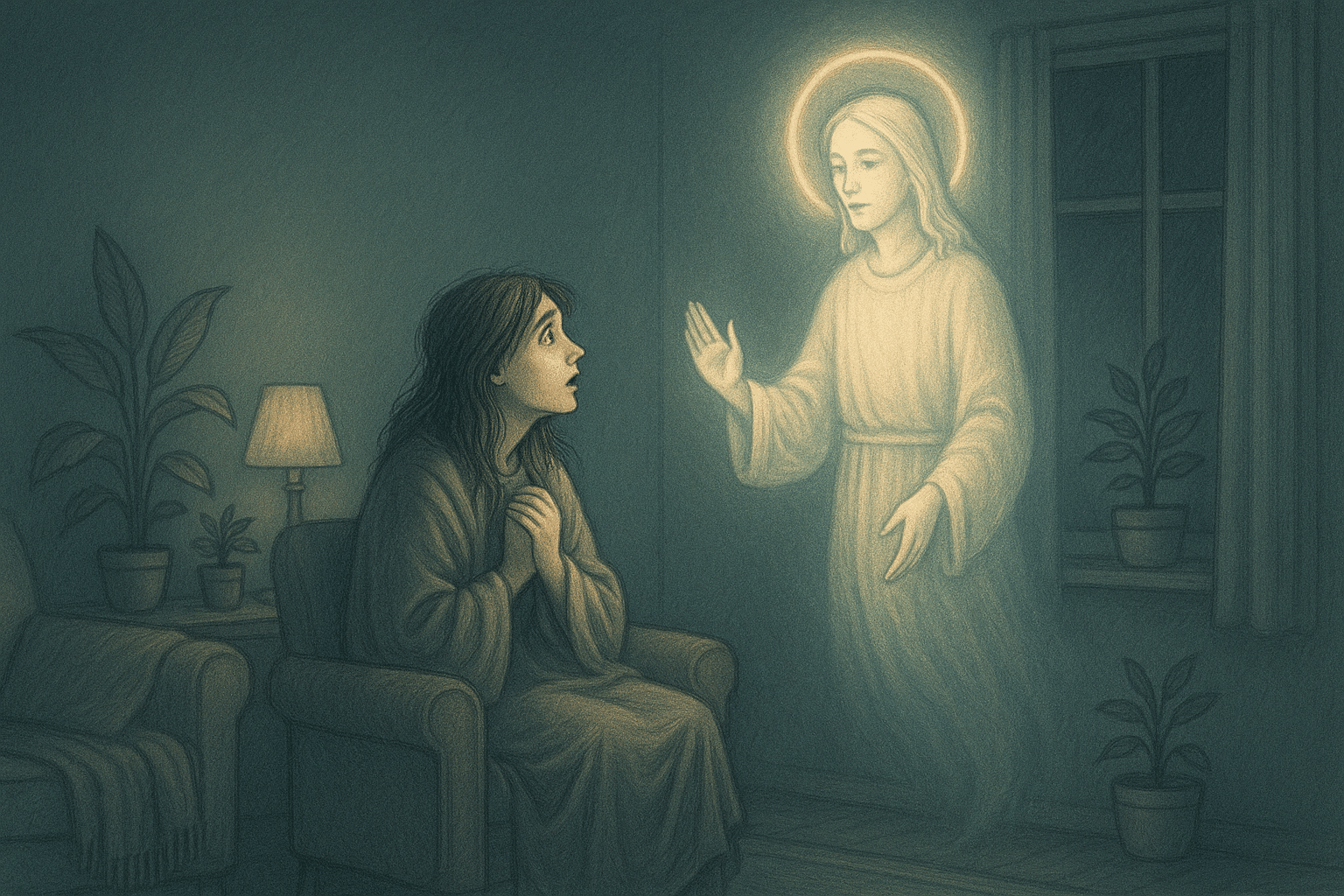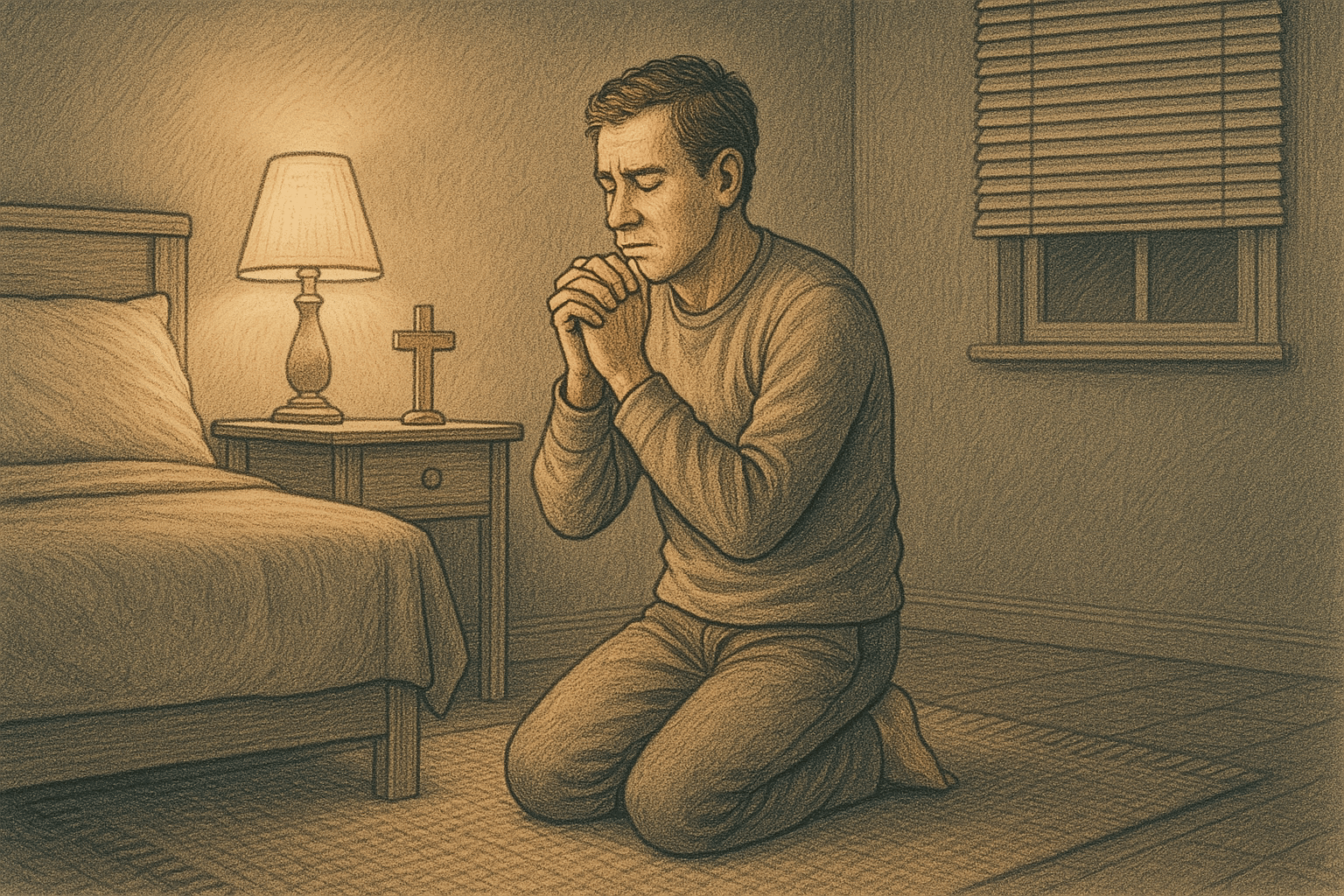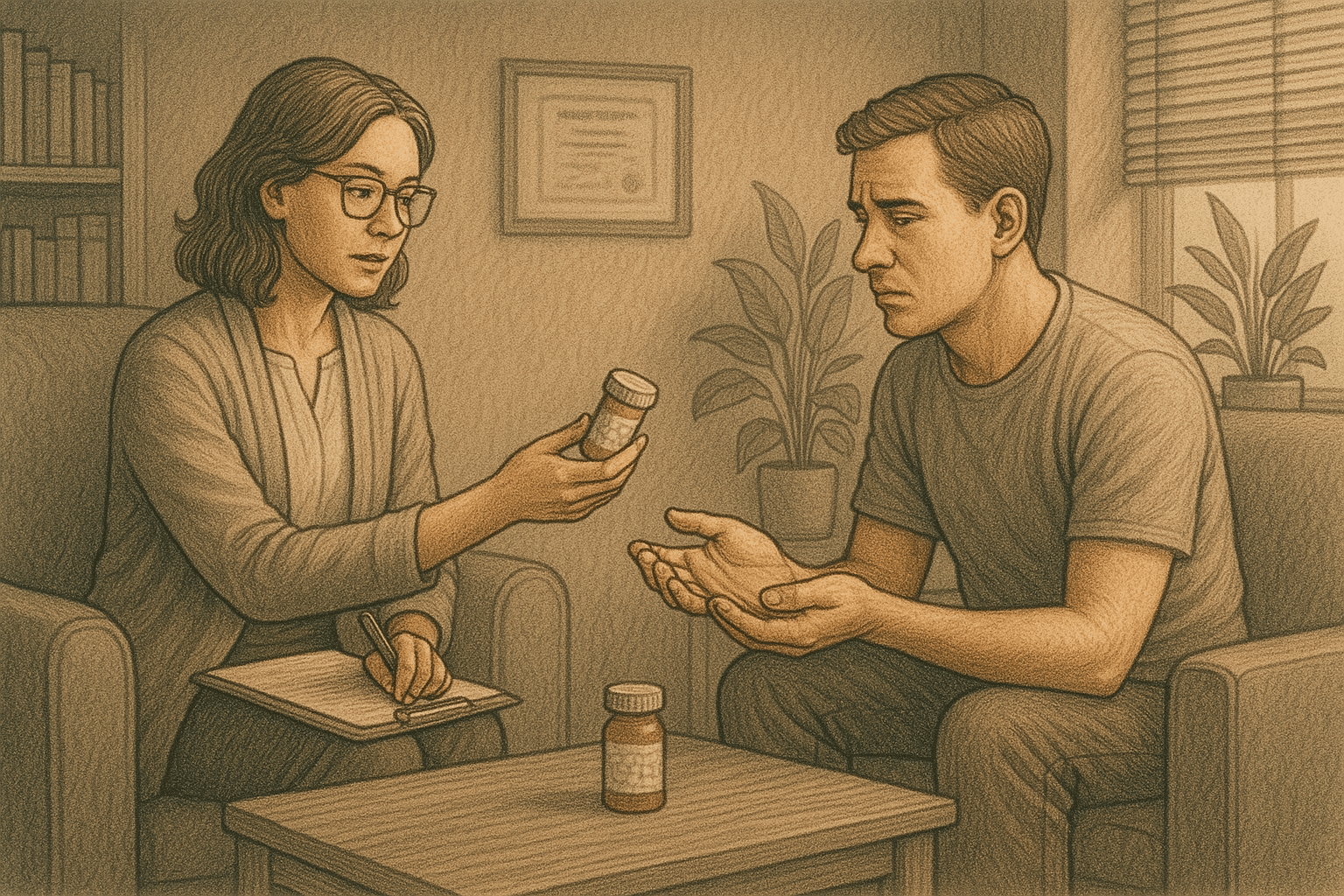Key Takeaways
- Religious psychosis involves hallucinations and delusions with religious themes.
- Symptoms can include disorganized thoughts and significant behavioral changes.
- Causes may include genetic factors, psychological stressors, and cultural influences.
- Effective treatment for religious psychosis combines psychotherapy (particularly CBT), medication, and support systems to address both symptoms and underlying causes.
- A Mission For Michael (AMFM) offers personalized, evidence-based care for religious psychosis in a supportive environment with 24/7 professional assistance and various treatment intensities from residential to outpatient options.
Religious Psychosis Overview
Religious psychosis is a condition where individuals experience psychotic symptoms intertwined with religious or spiritual themes. This can be a particularly distressing experience for both those directly affected and for their loved ones. The condition can distort one’s perception of reality, making it difficult to differentiate between what is real and what is imagined.
Defining Religious Psychosis
Religious psychosis is not a standalone diagnosis but rather a manifestation of psychotic symptoms where religious content predominates. It typically involves delusions, strongly held false beliefs, and hallucinations, which are sensory experiences without external stimuli. For example, someone might believe they are a prophet or hear divine voices giving them instructions.

An individual impacted by spiritual psychosis may believe they are a reincarnation of a goddess, or that spiritual deities and supernatural beings are speaking to them.
Impacts on Daily Life
The impacts of religious psychosis on daily life can be profound. It can affect an individual’s ability to function at work, maintain relationships, and perform daily tasks. The distress caused by the symptoms can lead to isolation, anxiety, and depression. In severe cases, individuals may engage in risky or harmful behaviors based on their delusions or hallucinations.
| A Mission For Michael: Expert Mental Health Care Founded in 2010, A Mission For Michael (AMFM) offers specialized mental health care across Southern California, Minnesota, and Virginia. Our accredited facilities provide residential and outpatient programs, utilizing evidence-based therapies such as CBT, DBT, and EMDR. Our dedicated team of licensed professionals ensures every client receives the best care possible, supported by accreditations from The Joint Commission and the California Department of Health Care Services. We are committed to safety and personalized treatment plans. Start your recovery journey with AMFM today! |
Recognizing Symptoms of Religious Psychosis
Hallucinations and Delusions
Hallucinations in religious psychosis often involve auditory or visual experiences with a religious context. For instance, hearing the voice of a deity or seeing religious figures can be common. Delusions might include beliefs of having a special religious mission or possessing divine powers.
These symptoms can be distressing and may lead to misunderstandings with others who do not share these experiences or beliefs. Approach these individuals with empathy and understanding, as their experiences are very real to them.
Disorganized Thoughts
Individuals may experience racing thoughts where thoughts move through their mind very rapidly, sometimes feeling out of control. They might also exhibit “flight of ideas,” where thoughts jump quickly from one concept to another, making connections that others don’t see.
Formal thought disorder (FTD) is another form of disorganized thinking which is often present in religious psychosis. This is when a person struggles to express thoughts in a logical and linear fashion, showing symptoms like tangentiality (veering off-topic), circumstantiality, and thought blocking.
Behavioral Changes

Religious psychosis often manifests through extreme religious characteristics that may alarm family and friends.
Common behavioral changes include suddenly visiting religious places (like churches) too frequently, praying continuously, or fasting to excessive degrees when there was no previous interest in such religious activities.
These behavioral changes typically lead to functional impairment, including inability to maintain employment, legal problems, or failure to fulfill obligations. There may also be homicidal or suicidal threats or behaviors as a result of religious delusions.
Connection to Other Psychotic Disorders
Religious psychosis often occurs in conjunction with other psychotic disorders, such as schizophrenia or bipolar disorder. These conditions share common features, including disruptions in thought processes and perceptions. The religious aspect adds a layer of complexity, as it involves deeply personal beliefs and cultural contexts. Understanding this connection is essential for effective treatment and management.
Main Causes of Religious Psychosis
Psychological Factors
Psychological stressors like stressful life events, trauma, or significant changes in one’s environment are significant contributors to religious psychosis. For instance, someone experiencing a loss or a major life transition may become more vulnerable to psychotic symptoms.
Additionally, certain cognitive biases and thinking patterns can predispose individuals to religious delusions. For example, individuals who already have a strong focus on religious or spiritual themes might interpret their experiences through this lens, leading to misinterpretations of reality.
Also, poor coping mechanisms and emotional regulation can further complicate the situation. When individuals struggle to manage stress or emotions, they might find themselves overwhelmed, which can contribute to the onset of psychotic episodes.
Genetic Influences
Research indicates that individuals with a family history of psychotic disorders are at a higher risk of developing similar conditions. This suggests that genetic predispositions can influence the likelihood of experiencing religious psychosis.
However, note that genetics alone do not determine the outcome. Environmental factors and personal experiences interact with genetic predispositions, influencing the overall risk and manifestation of the condition.
Cultural and Social Impact
Cultural and social contexts significantly shape the expression and interpretation of religious psychosis. In societies where religion plays a central role, individuals may experience psychotic symptoms with strong religious themes. This cultural context can influence how symptoms are perceived and whether they are seen as pathological or spiritual experiences.
For example, religious upbringing and beliefs can shape the content of delusions and hallucinations, and social isolation or lack of community support can exacerbate symptoms.
Understanding these cultural and social dynamics is crucial for developing culturally sensitive treatment approaches. It ensures that individuals receive the support they need without dismissing their beliefs or experiences.
Available Treatment Options
Psychotherapy Methods
Psychotherapy is a cornerstone of treatment for religious psychosis. Cognitive Behavioral Therapy (CBT) is particularly effective in helping individuals recognize and challenge distorted thinking patterns. Through CBT, individuals can learn to differentiate between reality and delusions, reducing the impact of psychotic symptoms on their lives.
Medication Options
Antipsychotic medications can help manage symptoms by reducing hallucinations and delusions. Medications may also be used to address co-occurring conditions, such as anxiety or depression.

Medication is often most effective when combined with psychotherapy and other supportive measures.
Besides medication, lifestyle changes and stress management techniques can also play a role in treatment. Encouraging individuals to engage in regular physical activity, maintain a balanced diet, and practice relaxation techniques can support overall well-being and recovery.
Community Support Systems
Community support systems are vital for individuals experiencing religious psychosis. Having a strong network of family, friends, and mental health professionals can provide the encouragement and guidance needed for recovery.
By fostering a supportive environment, individuals can feel more empowered to engage in their treatment plans and work toward recovery.
Encouraging Recovery
Maintaining Treatment Plans
Maintaining a consistent treatment plan is essential for managing religious psychosis. This involves regular therapy sessions, adherence to medication regimens, and ongoing communication with healthcare providers. It’s important for you to attend all scheduled appointments and actively participate in their treatment.
Setting realistic goals and tracking progress can help individuals stay motivated and focused on their recovery journey. Healthcare providers can work with individuals to adjust treatment plans as needed, ensuring they remain effective and aligned with the individual’s needs.
Promoting Awareness
Promoting awareness about religious psychosis can reduce stigma and foster a supportive environment. By educating communities about the condition, we can encourage empathy and understanding for those affected. This can be achieved through public awareness campaigns, educational workshops, and open discussions about mental health.
Finding Healing From Religious Psychosis With AMFM
Religious psychosis has a profound impact on individuals and their loved ones. This is why our comprehensive treatment approach at AMFM addresses not just the symptoms but the underlying causes of religious psychosis through evidence-based therapies, medication management, and strong community support systems.

With residential treatment centers in California, Virginia, and Washington, we provide personalized care in safe, judgment-free environments where healing can begin.
Our multidisciplinary team of experts specializes in treating psychotic disorders with religious themes, offering around-the-clock support and guidance throughout your recovery journey. Don’t let religious delusions, hallucinations, or disorganized thinking control your life or your loved one’s life any longer.
Contact AMFM today at 866-478-4383 for a confidential assessment and take the first step toward reconnecting with reality and reclaiming a fulfilling life free from the grip of religious psychosis.
Frequently Asked Questions (FAQs)
How is religious psychosis diagnosed?
Religious psychosis is diagnosed by a mental health professional through a comprehensive evaluation. This typically includes a clinical interview, assessment of symptoms, and consideration of the individual’s personal, family, and cultural background. Diagnosis may also involve ruling out other medical conditions or substance use that could contribute to the symptoms.
What differentiates religious psychosis from a spiritual crisis?
A spiritual crisis involves questioning or reevaluating one’s beliefs, often leading to personal growth and transformation. By contrast, religious psychosis involves symptoms such as hallucinations and delusions that impair functioning. It’s important to differentiate between the two, as the approaches to support and treatment differ significantly.
Can religious beliefs trigger psychosis?
While religious beliefs themselves do not cause psychosis, they can influence the content of psychotic symptoms in individuals who are predisposed to the condition. Cultural and environmental factors can shape how symptoms manifest and are interpreted. Understanding these influences is crucial for providing culturally sensitive care.
Is recovery from religious psychosis possible?
Yes, recovery from religious psychosis is possible with appropriate treatment and support. Many individuals experience significant improvements in their symptoms and quality of life through a combination of psychotherapy, medication, and community support. Early intervention and a strong support network are key factors in successful recovery.
Can someone with religious psychosis recover completely?
Yes, recovery from religious psychosis is possible with appropriate treatment. At AMFM, many individuals experience significant improvement in their symptoms and quality of life through our personalized combination of psychotherapy, medication management, and community support. Early intervention and consistent treatment adherence greatly enhance recovery outcomes.












